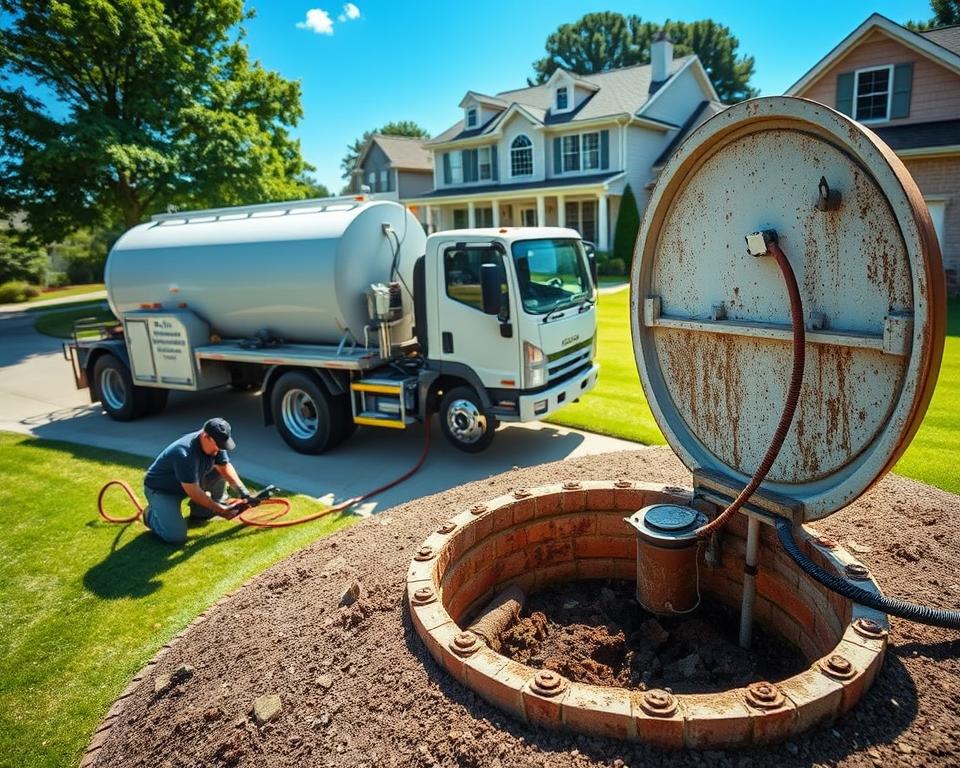Septic System Pumping
Ever pondered how often you should schedule septic system pumping to avert expensive malfunctions? With in excess of 20 percent of U.S. households relying on septic systems, grasping their maintenance is vital. Having a clear idea of when to plan a septic tank service is critical to its longevity. In addition, homeowners have access to affordable septic pumping services that ensure high-quality functionality while staying on budget. Below, we outline crucial upkeep recommendations useful for every homeowner.
Key Observations
- Scheduled septic system pumping is essential for smooth functioning.
- Spotting the signs that show the need for service can ward off major issues.
- Hiring qualified septic system pumpers secures top-quality maintenance.
- Cost-effective septic pumping options are available for homeowners.
- Periodic inspections support maximum system performance.
Know How Your Septic System Works
A septic system plays a crucial role in managing household wastewater, comprising several essential components that function collectively. The primary drain line carries wastewater from your home to the septic tank, where the process initiates. In the tank, an underground chamber, solids sink at the bottom, and bacteria break down these solids, cleaning the waste efficiently.
The clarified liquid outflow next moves from the septic tank to the distribution box, where it is spread evenly across the drain field or leach field. Here, the soil continues the filtration, additionally purify the wastewater. Understanding the functions of these septic system parts is vital. It enables homeowners to monitor and care for their systems efficiently.
Being aware of how your septic system functions allows you to take proactive maintenance measures. It’s advisable to have periodic meetings with professional service providers of septic systems – septic tank inspection near me. They supply crucial insights for peak functioning of your system. These specialists aid in arranging the required pump-outs and checks. This diligence can considerably extend your septic system’s lifespan.
The Value of Septic System Care
Maintaining your septic tank consistently is key for homeowners who want their system to remain reliable. A well-cared-for system offers peace of mind and safeguards your property’s value. Without proper care, you’re risking system breakdowns and health dangers.
Selecting a top-notch septic pumping service is essential. They provide timely inspections and pump-outs, extracting sludge and scum buildup. If maintenance is neglected, urgent pumping may be required, which is pricey.
Following a regular maintenance plan is wise. It includes professional evaluations and regular pumping. This proactive measure heads off urgent issues, providing a more secure living environment for everyone.

How to Tell Your Septic System Requires Service
Being alert to septic system issues can sidestep budget-breaking repairs and major damage. Common signs show when your system requires a check. These comprise:
- Slow drains throughout the house
- Pooling water in the yard above the drain field
- Foul odors near the septic tank or leach field
- Exceptionally thick grass growth in particular areas of your yard
These clues could signify problems that might cause your system failing. Prompt action is essential. Contacting septic pumping experts for an inspection aids. Early intervention prevents initial issues from growing into major ones. Moreover, consistent upkeep secures your system operates well and remains durable.
Septic System Pumping: Best Practices
Proper pumping of your septic tank is essential to sidestep hefty clogs and backups. It’s important to establish the ideal interval for maintenance. Homeowners should typically plan pumping every 2 to 5 years, subject to the tank’s size and household wastewater levels. Heavy use of garbage disposals may necessitate more frequent pumping.
Engaging experienced pumpers guarantees your tank gets a thorough clean and check-up. During pumping, technicians look for any issues, such as broken baffles. Detecting these problems promptly heads off larger expenses and inconveniences later. Routine pumping schedules and expert help secure your septic system’s trouble-free operation.
Regular Inspections Keep Your Septic System Running
Regular inspections are vital for your septic system’s performance. Septic system inspections uncover small issues before they worsen. Professionals advise inspections every three to five years, influenced by system size and household usage. This avoids expensive fixes.
Keeping maintenance records is crucial for monitoring your system’s condition. These records offer insights into previous inspections, repairs, and when to schedule septic tank cleaning services. With this information, organizing for future upkeep becomes simpler, retaining septic systems in prime shape.
Consistent inspections and detailed record-keeping not only enhance system efficiency but also extend its life. This strategy safeguards the environment and the investment in a safe, operational home.
| Inspection Type | Recommendation Frequency | Benefits |
|---|---|---|
| Visual Inspection | Annually | Identify surface issues |
| Professional Inspection | Every 3–5 years | Assess functionality and detect problems |
| Septic Tank Pumping | Every 3–6 years | Prevent overflow and system failure |
Water-Saving Habits for a Healthier Septic System
Efficient water use is key for keeping your septic system sound. It not only helps the environment but also improves the performance of your home’s plumbing. By adopting easy, yet effective, conservation methods, homeowners can cut down on wastewater.
Stagger your laundry activities over the week instead of doing them all at once. This allows the septic system to handle water better and avoids tank overflow. Choosing low-flow fixtures in your kitchens and bathrooms produces considerable water savings, maintaining the water pressure up while reducing the flow rate, thus diminishing the amount of wastewater produced each day.
Swiftly fixing leaks is another practice to help your septic system. Even a small leak can lead to a large waste of water, putting extra pressure on the septic system. Through regular inspections and repairs, you greatly aid the system’s efficiency.
Emphasizing water conservation isn’t just good for your septic system; it’s also a step towards environmentally responsible living. Integrating such practices into your daily routine helps both your household and the planet.
Best Practices for Household Waste Disposal
Homeowners hold a key role in preserving their septic system’s health by managing household waste correctly. It’s essential to avoid throwing away non-biodegradable items like wipes, plastics, and other hazardous products in the system. These items can create clogs, causing pricey repairs and a reduction in efficiency.
Composting food scraps and organic materials is a advantageous alternative to sending them to landfill. This practice markedly reduces the amount of solid waste entering the septic tank. Prioritizing biodegradable waste disposal helps maintain the ecological balance needed for effective waste management.
It’s vital to keep an eye on what goes down the drains. Non-decomposable items can necessitate more frequent septic tank pumping. By understanding and adhering to correct waste disposal methods, you can guarantee a more efficient and long-lasting septic system.
Safe Cleaning Products for Your Septic System
The health of your septic system largely hinges on your choice of cleaning products. Opting for septic-safe cleaning products is essential. These products shield the balance of beneficial bacteria that digest waste. Many standard cleaners have harmful chemicals that endanger this balance, leading to pricey repairs or system failure.
Homeowners should look into natural alternatives that are both effective and environmentally friendly. Common household items like baking soda, vinegar, and lemon juice are excellent choices. These natural cleaners are not only capable but also maintain your septic system’s health.
Avoiding products that contain antibacterial agents and chlorine bleach is important. Such substances damage the essential good bacteria, undermining your system’s functionality. By adopting sustainable products, you protect both the efficiency and longevity of your septic system.
Why Bacteria Matter in Septic Systems
Bacteria carry out a key role in keeping your septic system efficient. They break down solids on their own and enhance nutrient processing. A lack of healthy bacteria can cause system failure, resulting in expensive repairs.
Homeowners can improve their system by adding organic additives. These products raise beneficial bacteria, making waste decomposition more effective. It’s important to select organic additives that are helpful, not harmful, to the septic environment.
A healthy bacterial community is crucial to a septic system’s longevity and efficiency. It stops solid buildup and lessens the need for regular pumping. Focusing on bacterial health makes waste management more effective and eco-friendly.
Wrapping It Up
Septic system care is crucial for the durability and functionality of your home’s wastewater system. Following key maintenance tips avoids hefty repairs. Grasping routine pumping and inspections is key. This ensures your septic system stays in top condition.
Learning about your septic system’s operation and best practices in water and waste management is crucial. Engaging professionals like All in Sanitation offers expertise. This helps secure your septic system’s long-term health and provides confidence.
Investing in proper septic maintenance today brings future benefits. It safeguards your home and enhances your family’s quality of life. Emphasizing septic system care gives certainty with a well-maintained system.


